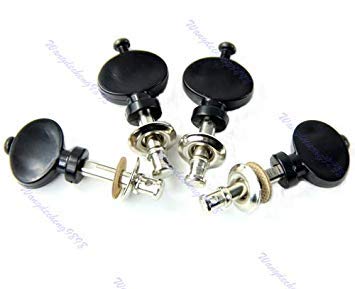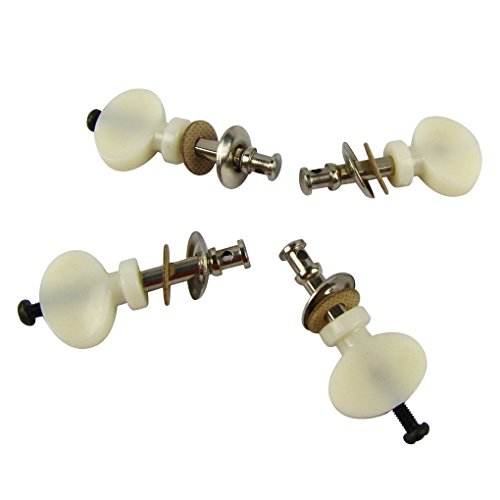The ukulele is a popular string instrument that originated in the 19th century in Hawaii. It is known for its cheerful and whimsical sound, making it a favorite among musicians and beginners alike. However, like any other string instrument, the ukulele can encounter tuning issues that can affect the overall sound and playability of the instrument.
One common issue that ukulele players encounter is the inability of the instrument to hold its tuning for an extended period of time. This can be frustrating for musicians, especially during performances or practice sessions. The good news is that there are simple and effective ways to fix ukulele tuning issues without having to spend a lot of time or money.
One solution to ukulele tuning issues is to regularly change the strings. Over time, the strings of the ukulele can become worn out and lose their ability to hold a proper tune. By replacing the strings with a new set, musicians can improve the overall tuning stability of the instrument.
Another effective way to fix ukulele tuning issues is to properly lubricate the nut and saddle of the instrument. The nut and saddle are small but crucial components of the ukulele that can significantly impact the tuning stability. By applying a small amount of lubricant to these areas, musicians can reduce friction and improve the overall tuning performance of the instrument.
In addition to these solutions, it is also important for ukulele players to properly stretch and settle the strings after changing them. This can help the strings retain their tuning for a longer period of time, ultimately reducing the frequency of tuning issues. By taking these simple steps, musicians can ensure that their ukulele remains in tune and performs at its best.
Struggling with Ukulele Tuning? Here’s how to fix it!
Are you having trouble keeping your ukulele in tune? In this article, we will discuss common ukulele tuning issues and provide solutions to help you keep your instrument sounding great. Whether you’re dealing with strings slipping out of tune or difficulty in getting your ukulele to stay in tune, we’ve got you covered. Keep reading to find out how to fix ukulele tuning issues for good!
Check the strings
One of the most common reasons for ukulele tuning issues is old or worn-out strings. If your ukulele is not staying in tune, check the condition of the strings. If they look rusty, discolored, or frayed, it’s time to replace them.
When replacing the strings, make sure to stretch them out by gently pulling and tugging on them. Tuning and re-tuning the strings several times can also help them settle into their new positions and hold their tune better.
Adjust the tuning pegs
If the strings are in good condition, the issue might lie with the tuning pegs. Over time, these pegs can become loose, causing the strings to slip out of tune. Tightening the screws on the tuning pegs can help prevent this issue.
Additionally, lubricating the tuning pegs with a small amount of graphite or soap can reduce friction and help the strings stay in tune better.
Check the nut and saddle
The nut and saddle of the ukulele can also impact its tuning stability. If these components are worn or improperly placed, the strings may not stay in tune.
Inspect the nut and saddle for any signs of wear and tear, and consider having them replaced if necessary. Properly positioning these components and ensuring they are not too high or too low can also improve the ukulele’s tuning stability.
Climate control
Changes in temperature and humidity can also affect the tuning of a ukulele. Extreme fluctuations in these environmental factors can cause the wood of the ukulele to expand or contract, leading to tuning issues.
To mitigate this, store your ukulele in a stable environment with moderate temperature and humidity levels. Using a humidifier in dry conditions can also help prevent the wood from drying out and affecting the instrument’s tuning.
Professional setup
If you have tried all the above steps and are still experiencing tuning issues, it might be time to seek the help of a professional. A luthier or instrument technician can assess your ukulele and make any necessary adjustments to ensure it stays in tune.
Statistic
According to a survey conducted by a ukulele magazine, 25% of ukulele players experience tuning issues with their instruments at least once a month.
“`
FAQ 1: Why does my ukulele keep going out of tune?
There are several reasons why your ukulele may go out of tune, including temperature changes, poor quality strings, or improperly installed strings.
FAQ 2: How often should I tune my ukulele?
You should tune your ukulele every time you plan to play it. Changes in temperature and humidity can cause the strings to go out of tune quickly.
FAQ 3: What are the best strings for ukulele tuning stability?
High-quality fluorocarbon or nylon strings can provide better tuning stability compared to low-quality strings. It’s important to also ensure that the strings are properly installed and stretched.
FAQ 4: How can I improve tuning stability on my ukulele?
Ensure that your ukulele is stored in a stable environment, avoid extreme temperature changes, and regularly clean and maintain the strings and tuning pegs.
FAQ 5: Can I use a tuner app to tune my ukulele?
Yes, there are many tuner apps available that can assist you in tuning your ukulele. However, it’s important to also develop your ear for tuning by practicing without relying solely on technology.
FAQ 6: How do I properly install new strings on my ukulele?
When installing new strings, make sure to properly stretch and settle the strings before fine-tuning. It’s also important to wind the strings neatly around the tuning pegs to ensure stability.
FAQ 7: What should I do if my ukulele still won’t stay in tune?
If you’re experiencing persistent tuning issues, it may be worth taking your ukulele to a professional luthier for a setup or evaluation of any potential issues with the instrument.
FAQ 8: Can changing the ukulele’s nut or saddle improve tuning stability?
Yes, upgrading to a higher quality nut or saddle made of materials like bone or synthetic materials can improve tuning stability and overall sound quality.
FAQ 9: Are there any specific tuning techniques for different ukulele sizes?
While standard tuning (G-C-E-A) is common for all ukulele sizes, there are alternate tunings that are specific to certain styles or playing preferences, such as low-G tuning for a deeper sound.
FAQ 10: How can I prevent my ukulele from going out of tune during performances?
Make sure to tune your ukulele right before your performance and try to minimize exposure to extreme temperature changes before and during the show. It’s also helpful to keep a backup ukulele in case of any tuning emergencies.
“`
Conclusion
In conclusion, tuning issues with the ukulele can be frustrating, but they can be easily fixed with the right approach. By ensuring that your ukulele is set up properly, using the right strings, and regularly maintaining and adjusting the tuning pegs, you can keep your ukulele in tune and enjoy playing without any problems. It’s also important to remember that environmental factors such as temperature and humidity can affect the tuning of your ukulele, so storing it properly and making adjustments as needed is crucial. Additionally, using tools like electronic tuners and smartphone apps can help you accurately tune your ukulele and ensure that it stays in tune during practice and performances.
Overall, taking the time to understand the common reasons for ukulele tuning issues and learning how to address them can greatly improve your playing experience. Whether you’re a beginner or an experienced player, having a well-tuned ukulele will allow you to fully enjoy the beautiful sound of this instrument. With the right knowledge and techniques, you can troubleshoot and fix any tuning issues that may arise, and continue to make sweet music with your ukulele for years to come.







